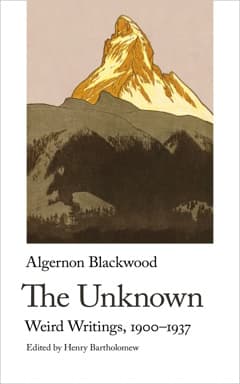
The Unknown: Weird Writings, 1900–1937 by Algernon Blackwood (ed. Henry Bartholomew)
(Handheld Press, 2023)
Reviewed by Kevan Manwaring
Master of the supernatural tale Algernon Blackwood (1869-1951) has long had his devoted acolytes, but in recent years the British writer of Horror and Weird fiction has had something of a resurgence of interest, with more of his work—once tracked down like uncanny beasts in the backwoods of obscure bookshops—in print now than ever. The British Library’s ‘Tales of the Weird’ imprint has republished many of his classic tales; and now joining this wave is Bath-based small press, Handheld Press, which specialises in republishing lost classics.
One may ask what a new collection would add, but Henry Bartholomew’s selection provides a great introduction to Blackwood’s oeuvre, bringing together (apparently for the first time) some of his fiction and non-fiction. Also, Bartholomew eschews the more widely anthologised tales such as ‘The Willows’ and ‘The Wendigo’ for lesser-known gems, ‘Skeleton Lake’, ‘The Wolves of God’, ‘The Glamour of Snow’, ‘The Sacrifice’, ‘The Insanity of Jones’, ‘The Tarn of Sacrifice’, and ‘By Water’. These provide a good sampler of Blackwood’s work.
No one evokes wilderness in short fiction better than Blackwood—one feels he is conveying something not researched vicariously but embodied (which we know is the case from his canoe trips into the Canadian interior, and his lifelong love of skiing and hiking). Blackwood knows mountains and vast tracts of wilderness. He captures the sublime of these places like no one else—the grandeur and terror. Long before such concepts became fashionable, his stories explored the more-than-human. Blackwood’s universe is non-anthropocentric, shaking its protagonists out of their hubristic solipsism. The natural world has sentience and agency, and shows if not antagonism, then indifference towards the folly of man and his tiny presence in the landscape. These stories were written long before the Anthropocene became a concept, although of course humans have been impacting the environment for millennia, but not on the catastrophic scale of the last few decades. Nevertheless, one can see intimations of deep ecology in Blackwood’s work, even if he himself might have resisted the term—for his agenda always veers towards the esoteric, not surprisingly considering his deep interest in the occult, from his early membership of the Theosophical Society onwards. Blackwood had a fascination with reincarnation and the nature of consciousness, ideas that might not stand up to the cold light of day but provide excellent material for his stories. Indeed, they find optimum expression through the lens of fiction, because as essays (e.g., ‘On Reincarnation’) they are less convincing.
Blackwood is not an essayist of the first rank, but his articulation of the creative process (‘The Genesis of Ideas’) does make for interesting reading; although a comparison to Poe’s ‘The Philosophy of Composition’, Lovecraft’s ‘Supernatural Horror in Literature’, or MR James’ ‘Some Remarks on Ghost Stories’ shows how slight it is—a tantalising glimpse behind the veil of Blackwood’s process, but nothing more.
Blackwood was certainly a remarkable figure, a consummate storyteller, who changed with the times in a way Poe, Lovecraft, and James didn’t, embracing the (then) new medium of television with his popular broadcasts for the BBC. Something of this enthralling voice comes through in this tantalising collection of prose. It is enough to draw the uninitiated deeper in—and once immersed in Blackwood’s bleak, beautiful universe, there is no escape. It has claimed your soul, like the unfortunate protagonists of many of his stories who find themselves out of their depth, as in the cautionary tale, ‘By Water’: ‘You will drown, but will not know you drown.’
Worth getting for Bartholomew’s introduction alone, which is a superb piece of Blackwood scholarship; but also for some truly masterful tales—especially ‘The Glamour of the Snow’; ‘The Sacrifice’; and ‘The Tarn of Sacrifice’—this collection is a worthy addition to any library of the Weird.
Review from BSFA Review 20 - Download your copy here.
